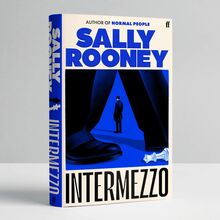In her latest novel, Intermezzo, Sally Rooney continues her exploration of intimate relationships, albeit with a shift away from the clear political critique that characterised her earlier works. Its focus lies on what makes personal relationships successful, and, surprisingly, on unconditional love as something close to God.

Rooney’s previous novel, Beautiful World, Where Are You, ended with one character stepping back from activism, retreating into a subjective sense of peace and stability: dependent, the reader might think, on sufficient income. That choice felt tentative, an individual’s decision to pursue personal happiness over political engagement. With Intermezzo, however, this focus on private happiness and detachment from societal ills is presented not as a protagonist’s choice but as a theme that permeates the entire narrative.
The novel centres on two brothers, Peter and Ivan Koubek, and their relationships. While both experience obstacles to personal fulfilment, the political elements that once gave the novelist’s protagonists a radical edge are less prominent. Where readers might expect young characters to challenge economic precarity or political hypocrisy within contemporary Irish society, these issues fade into the background as their concerns become far more personal. Social difference plays a role, particularly in terms of financial stability, but the characters no longer stand out as a challenge to the establishment. The Koubek brothers’ half-Slovak background is little more than a narrative footnote, an embarrassment for Peter, who strives to fit in with his professional colleagues, but it provides no further depth or meaningful friction within the plot.
The cast includes a lawyer, a freelance data analyst, an arts centre manager, a university lecturer, and a student: all inhabiting or aspiring to middle-class worlds, removed from the working-class struggles that had space in Rooney’s earlier works.
One of the most significant shifts in Intermezzo is its treatment of religion. In prior novels, several of Rooney’s protagonists were atheist or agnostic, viewing the world through a materialist lens. In Beautiful World, Where Are You?, Eileen, untypically, joins her life with that of a devout Christian before withdrawing into private happiness. While this instance might have been a character choice, Rooney recently stated in an interview with The Irish Times on the publication of Intermezzo: “I have gone from being a dogmatic atheist to being very interested in the intellectual and spiritual traditions of Christianity.”
This shift is reflected in Intermezzo, where conversations about God and religion occur frequently. While the fervour varies, religious belief is no longer questioned or subverted but embraced as part of personal transformation and the overall authorial perspective. As a result, Intermezzo veers dangerously close to sentimentality, wrapping complex human conflicts in a neat bow of “spirituality” and fulfilment in love.
Walter Scott famously dismissed demands for Ivanhoe to marry Rebecca at the end of his novel, calling such an outcome historically indefensible. Similarly, contemporary novelists examining the Irish establishment must provide plots and endings that force readers to confront the consequences of social class, social relations, and mobility. Yet, Rooney’s previous protagonists, who often reflected a left-wing ethos and explored the alienation inherent in capitalist society, now gravitate toward places removed from society.
Ivan, despite some social and economic insights, imagines retreating with Marianne, suggesting that Rooney now views private, secluded happiness as a viable solution to alienation. None of the characters in the novel leave their comfort zones to seriously combat injustice.
The novel’s vision of love as a place apart is disconnected from the broader struggles that haunt the real world. For readers who admired Rooney’s earlier critiques of alienation, Intermezzo may feel less like a continuation of her political journey and more like a departure from it.
This artistic trajectory contrasts starkly with Rooney’s political commitments. She is perceptive to the nature of the publishing establishment: “I often feel discouraged by the publishing industry. I often see new novels marketed as ‘for fans of Sally Rooney.’ I find that so dispiriting—the invention of a certain type of person for the purposes of book marketing. And it makes me feel complicit in the commodification and cheapening of literary culture.” Her personal convictions remain unapologetically left-wing. She is highly respected in Ireland for her bold stances, including her protest against Israel’s policies in Palestine and her decision to withhold Hebrew translation rights. Her articles in The Irish Times critique Western complicity in the genocide of Palestinians, highlighting the “moral depravity” of leaders endorsing these atrocities. She has criticized the Irish government’s wavering stance on boycotting Israeli goods and condemned their “see no evil” attitude toward the US. Additionally, she is a prominent signatory of the latest open letter by artists calling for sanctions against Israel.
In a recent Irish Times interview about Intermezzo, Rooney remarked: “I don’t want to stay silent in the face of genocide. The horrors unfolding in Gaza feel to me like a turning point in history. How are we allowing this to happen? How is it possible that we have collectively failed to stop such a flagrant and unconcealed campaign of mass murder? These are extremely serious questions, perhaps more serious than we have yet realized.” There is no doubt she has put her head above the parapet. It is therefore surprising that instead of defying or questioning the social status quo in Ireland, Intermezzo gravitates to the comforts of convention.






